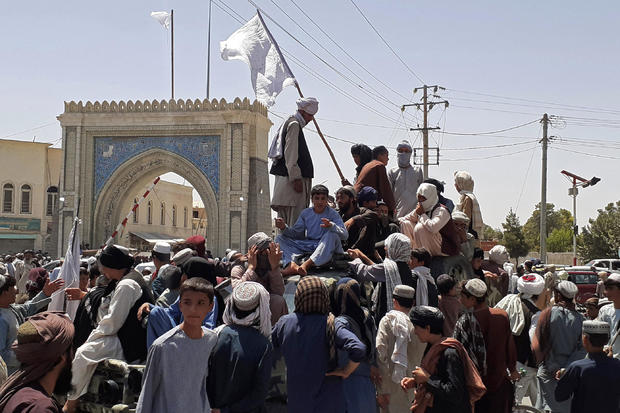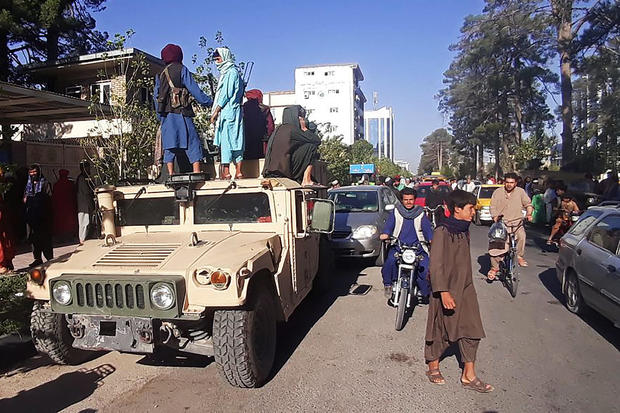Talibans stunning lightning advance in Afghanistan continues
The Taliban have captured another three provincial capitals in southern Afghanistan, including in Helmand, the scene of some of the heaviest fighting in the past two decades, as the insurgents press a lightning offensive that is gradually encircling the capital, Kabul.
And the United Nations is warning that a "humanitarian catastrophe" may be emerging in Afghanistan as civilians flee the oncoming Taliban.
The loss of Helmand's provincial capital comes after years of toil and blood spilled by American, British and allied NATO forces. Hundreds of foreign troops were killed there over the course of the nearly two-decade war.
The insurgents have taken more than a dozen provincial capitals in recent days and now control more than two-thirds of the country just weeks before the U.S. plans to withdraw its last troops.
While Kabul isn't directly under threat yet, the losses and the battles elsewhere further tighten the grip of a resurgent Taliban, who continue to press their offensive.
"The U.S.-backed Afghan military has been no match for Taliban fighters who are taking advantage of the vacuum left by the U.S. troop withdrawal," says CBS News correspondent Roxana Saberi. "With stunning speed, Taliban fighters are sweeping across Afghanistan."
 Taliban fighters stand on a vehicle along a roadside in Kandahar, Afghanistan on August 13, 2021. AFP via Getty Images
Taliban fighters stand on a vehicle along a roadside in Kandahar, Afghanistan on August 13, 2021. AFP via Getty Images With security rapidly deteriorating, the United States planned to send in 3,000 troops to help evacuate some personnel from the U.S. Embassy in Kabul. Separately, Britain said about 600 troops would be deployed on a short-term basis to support British nationals leaving the country, and Canada is sending special forces to help evacuate its embassy.
The staff drawdown at the U.S. Embassy "is sure to embolden the Taliban even more," Saberi says.
Attaullah Afghan, the head of the provincial council in Helmand, said Taliban fighters captured the provincial capital of Lashkar Gah following heavy fighting and raised their white flag over governmental installations. He said three national army bases outside of Lashkar Gah remained under control of the government.
Atta Jan Haqbayan, the provincial council chief in Zabul province, said the local capital of Qalat fell to the Taliban and that officials are in a nearby army camp preparing to leave.
Two lawmakers from Afghanistan's southern Uruzgan province said local officials have surrendered the provincial capital, Tirin Kot, to the rapidly advancing Taliban. Bismillah Jan Mohammad and Qudratullah Rahimi confirmed the surrender Friday. Mohammad says the governor is en route to the airport to depart for Kabul.
 Taliban fighters stand on a vehicle on a road in Herat, Afghanistan's third biggest city, on April 13, 2021, after government forces pulled out the day before following weeks of being under siege. AFP via Getty Images
Taliban fighters stand on a vehicle on a road in Herat, Afghanistan's third biggest city, on April 13, 2021, after government forces pulled out the day before following weeks of being under siege. AFP via Getty Images The latest advances came hours after the insurgents captured the country's second and third largest cities in a lightning advance. The seizures of Kandahar and Herat mark the biggest prizes yet for the Taliban.
The fighting has pushed hundreds of thousands of people to flee in recent months, Saberi says.
"Many are coming to Kabul seeking safety. They've left behind their homes, their belongings and even loved ones killed in the fighting," she adds.
Those fleeing fear the Taliban will again impose a brutal, repressive government, all but eliminating women's rights and conducting public executions.
At the United Nations, U.N. Secretary General António Guterres did not mince words about the "grave situation" in Afghanistan, CBS News' Pamela Falk reports.
"Even for a country that has tragically known generations of conflict, Afghanistan is in the throes of yet another chaotic and desperate chapter â€" an incredible tragedy for its long-suffering people," Guterres said. "Afghanistan is spinning out of control."
The Reuters news agency reports that Thomson Phiri of the World Food Program told a U.N. briefing Friday, "We fear the worst is yet to come and the larger tide of hunger is fast approaching ... The situation has all the hallmarks of a humanitarian catastrophe."
"They are sleeping in the open, in parks and public spaces," Reuters quotes U.N. Office for the Coordination of Humanitarian Affairs spokesman Jens Laerke as saying. "A major concern right now is simply finding shelter for them."
Peace talks in Qatar remain stalled, though diplomats are still meeting, as the U.S., European and Asian nations warned that any government established by force would be rejected.
The latest U.S. military intelligence assessment suggests Kabul could come under insurgent pressure within 30 days and that, if current trends hold, the Taliban could gain full control of the country within a few months. The Afghan government may be forced to pull back to defend the capital and just a few other cities in the coming days if the Taliban maintain momentum.
The onslaught represents a stunning collapse of Afghan forces after the United States spent nearly two decades and $830 billion trying to establish a functioning state after toppling the Taliban in the wake of the September 11 attacks. The advancing Taliban ride on American-made Humvees and carry M-16s pilfered from Afghan forces.
Afghan security forces and the government haven't responded to repeated questions from journalists, instead issuing video communiques that downplay the Taliban advance.
Bill Roggio, a senior fellow at the Foundation for Defense of Democracies, said the Afghan army has rotted from within due to corruption and mismanagement, leaving troops in the field poorly equipped and with little motivation to fight. The Taliban, meanwhile, have spent a decade taking control of large swaths of the countryside, positioning themselves to rapidly seize key infrastructure and urban areas once President Joe Biden announced the U.S. withdrawal.
The difficulty of moving troops out to the provinces means the government is likely to focus all its efforts on defending the capital.
U.S. Central Command has acknowledged carrying out several airstrikes in recent days, without providing details or commenting on the concerns over civilian casualties.
A United Nations agency warned that civilians in southern Afghanistan faced cut-off highways and mobile phone outages. It described aid groups as being unable to determine how many people had fled as intense fighting and airstrikes continued there.
In Kabul and surrounding central provinces that remain under government control, the U.N.'s Office for the Coordination of Humanitarian Affairs said "the security situation remained unstable and unpredictable with elevated conflict and violence."

0 Response to "Talibans stunning lightning advance in Afghanistan continues"
Post a Comment